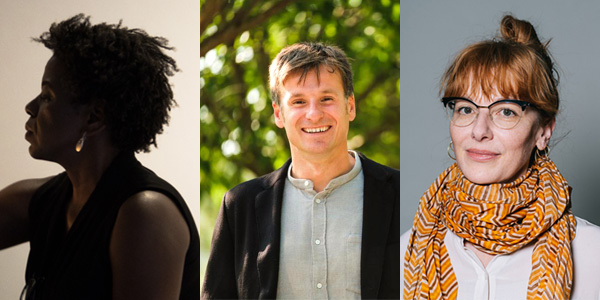
C+CSJS: Critical + Creative Social Justice Studies
(Dr. Denise Ferreira da Silva, Institute for Gender, Race, Sexuality & Social Justice, PI)
The Transformative Justice Praxis involves gathering, studying, and disseminating current antiracist and anticolonial artistic and discursive productions by BIPOC (Black, Indigenous, and People of Color) and LGBTQI+ Brazilian and Peruvian individuals and collectives.
C+CSJS’s collaborators in this project are organizations and individual or collectives of artists, activists and academics based in South America and Europe. The global north based collaborators aim to support, foster, and disseminate works that expose how the COVID-19 pandemic highlights and reinforce long-seated colonial, social, and racial inequities in these countries. The activities consist in study sessions as well as the commission, translation, and publication of critical and creative works by global south collaborators.
Two UK-based art institutions are involved in this project: Iniva and Arika. The collaboration will cover commission, translation, and publication of new art works. Iniva will be involved primarily with translation, publication, and hosting paperback version of the written texts at the Stuart Hall. Arika will organize public debates between collaborating artists and researchers which will be widely shared through their networks. The artwork (images, sounds, and texts) produced and/or translated throughout the project will be exhibited through the online platform EhChO.org.
Canadian Network of Law and Humanities
(Dr. Julen Etxabe, Peter A. Allard School of Law, PI)
Law and Humanities is an interdisciplinary approach that emphasizes the cultural, literary, and imaginative aspects of law, without forgetting its ethical and political implications. As a field of research, law and humanities encompasses diverse areas of study, including law and literature, legal storytelling, law and film, law and language, critical race theory, feminist approaches to law, law and emotions, etc. In addition, law and humanities scholars seek to reflect on law as an embodied and sensorial practice and welcome experiential and creative pedagogies in the classroom, such as theatre-based teaching and the arts (painting, graphic novels, music, etc.).
The cluster in Law and Humanities is the first to propose the creation of a Canadian network of law and humanities. The network seeks to connect scholars working in this interdisciplinary field on a more permanent basis. Several aims animate this idea for a Law and Humanities cluster: to be a central catalyst for law and humanities research in Canada; to foster collaborative projects; to create a space where the community can share common resources to generate synergies for planning future events; and, to disseminate knowledge-relevant scholarship and teaching practices through its various media platforms. The main objective of the cluster is therefore to increase the visibility of law and humanities studies in Canada and to heighten the impact of the research being done.
Critical Image Forum: Research in Photography and Expanded Documentary
(Dr. Althea Thauberger, Department of Art History, Visual Art & Theory, PI)
Critical Image Forum is an emerging research cluster focused on the political, ethical, aesthetic and social dimensions of expanded documentary practices. Since the advent and rapid popularization of photography, the relationship between photographic imagery and claims to truth have been proposed and disputed. Photographic images have also been used to subvert authoritarian interests, critique propaganda and counter ambivalence. Digital networks and expanded platforms of distribution have rapidly changed the field of photographic discourse. The hybridization of media necessitates a multi-disciplinary dialogue, however, critical visual literacy lags behind the pace of consumption.
The Critical Image Forum has been formed on the premise that, within the global circulation of mass visual imagery, an ethics of documentation must be continually re-examined. Intrinsic to photography is a “temporal recursivity”– a backward and forward movement through time that invites perpetual “returns.” (Smith, 2020). We must evaluate photography from the past as well as what’s to come–not by its nature, but by the effects of its uses.
Discourses relating to the photographic document are profoundly influential and entangled with practices in the fields of moving image production, sound, performance and new media. Our interdisciplinary and multimodal research is based in urgent issues of image literacy, and is based in the premise that the image incorporates a broad spectrum of re/presentation. Our cluster activities will focus on outward facing research of interest to general audiences, and pedagogical applications.